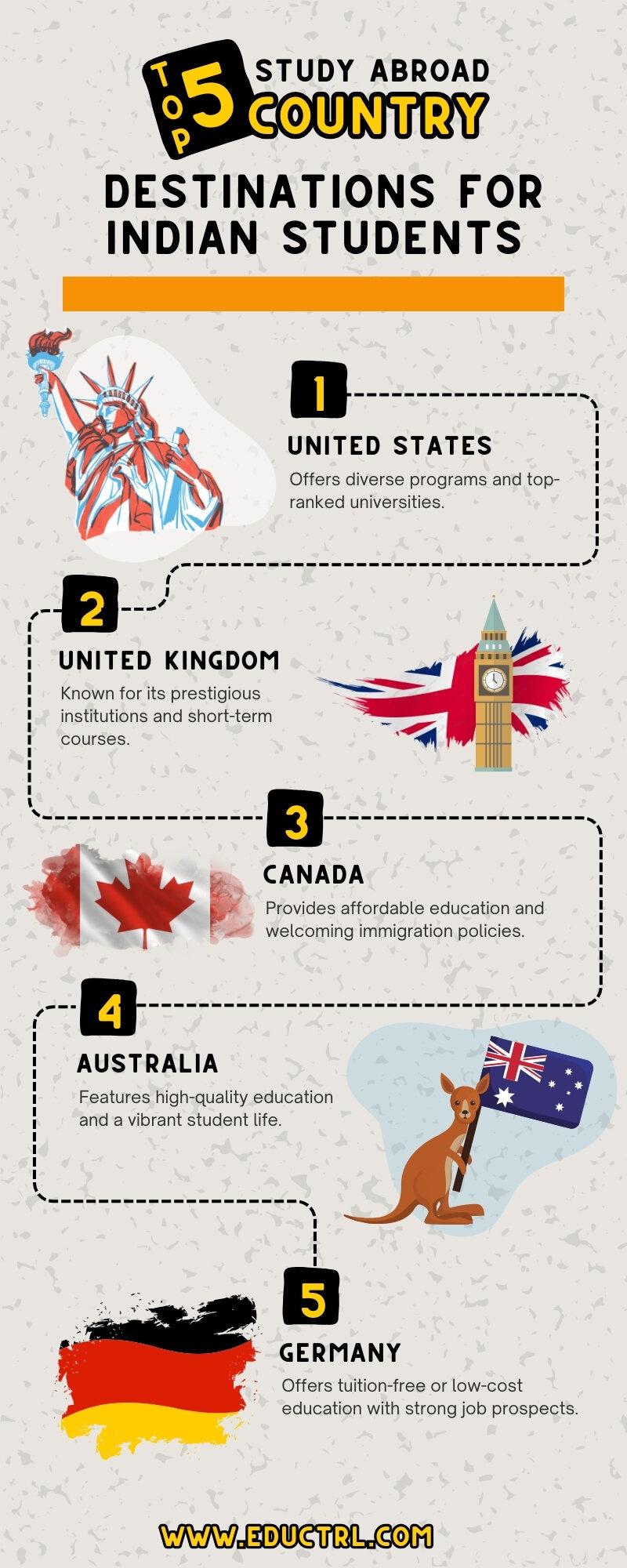Table of Contents

Education overseas has turned into a life-changing experience for the students. It opens the door to new cultures, perspectives, and job opportunities that are inextricably linked to the classrooms and the world beyond it. More so, in the current world where all nations are closely linked, selecting the right country to study is very vital. Australia, the UK, Canada, the USA and Germany have become more popular because of their education system, culture and spurring career opportunities.

Every country has its strengths majoring in state-of-the-art research facilities, and post-study work opportunities, among other benefits. This makes each of them suitable for students who seek to break the limits and get the desired education and job. In this blog, you can learn why these five countries have emerged as popular study-abroad destinations for students from India and the prospects & issues faced while studying in these countries.
1. Australia

Why Australia? Australia has remained one of the most preferred study destinations for students from India because of their quality education, cultural diversities and better student-related facilities. It has many international standard universities and provides several programs mainly in engineering, IT and health sciences.
Popular Courses:
Engineering
- Information Technology
- Business Management
Medicine and Healthcare
Advantages:
Post-study work visa options
- Opportunity for permanent residency
- Multicultural environment
High standard of living
Challenges:
High tuition fees and living costs
Strict visa requirements
Key Universities:
University of Melbourne
- Australian National University
University of Sydney
Here is some more information on these Universities:
| University of Melbourne | AUD 40,000 per year | ₹21,00,000 |
| Australian National University | AUD 39,000 per year | ₹20,47,500 |
| University of Sydney | AUD 42,000 per year | ₹22,05,000 |
2. United Kingdom

Why the UK? The UK is known for its prestigious universities, such as Oxford, Cambridge, and Imperial College London. This has led to the country’s emphasis on research, innovation and creativity, hence making it an ideal place for students who would want to achieve the best.
Popular Courses:
Business and Management
- Engineering
- Law
Arts and Humanities
Advantages:
One-year master's programs
- Rich historical and cultural experience
Extensive scholarship opportunities
Challenges:
High cost of living, especially in London
Competitive admission process
Key Universities:
University of Oxford
- University of Cambridge
London School of Economics and Political Science (LSE)
Here is some more information on these Universities:
| University of Oxford | GBP 30,000 per year | ₹31,50,000 |
| University of Cambridge | GBP 28,000 per year | ₹29,40,000 |
| London School of Economics (LSE) | GBP 25,000 per year | ₹26,25,000 |
3. Canada

Why Canada? Canada is famous for its inclusive, safe, and welcoming environment. It offers high-quality education at relatively affordable costs compared to other popular destinations. With an emphasis on research and a strong post-graduation work program, Canada is ideal for students looking for academic and career growth.
Popular Courses:
Engineering
- Computer Science
- Business Studies
Biotechnology
Advantages:
Affordable education and living costs
- Opportunities for permanent residency
- Multicultural society
High employability rate
Challenges:
Cold weather, especially in regions like Quebec
Competitive admission process for top universities
Key Universities:
University of Toronto
- University of British Columbia
McGill University
Here is some more information on these Universities:
| University of Toronto | CAD 60,000 per year | ₹36,00,000 |
| University of British Columbia | CAD 55,000 per year | ₹33,00,000 |
| McGill University | CAD 50,000 per year | ₹30,00,000 |
4. United States of America

Why the USA? The USA remains a favorite country of destination for Indian students because of the availability of a vast number of courses, upgraded infrastructure and globally accredited degrees. This country provides students with some of the best opportunities to carry out their research and innovation activities making it popular among international learners.
Popular Courses:
Computer Science
- Business and Management
- Engineering
Data Science
Advantages:
A wide range of universities and programs
- Strong focus on research and development
Opportunities for scholarships and financial aid
Challenges:
High tuition fees and living expenses
Lengthy and complex visa application process
Key Universities:
Massachusetts Institute of Technology (MIT)
- Stanford University
Harvard University
Here is some more information on these Universities:
| Massachusetts Institute of Technology (MIT) | USD 55,000 per year | ₹45,65,000 |
| Stanford University | USD 54,000 per year | ₹44,82,000 |
| Harvard University | USD 52,000 per year | ₹43,16,000 |
5. Germany

Why Germany? Germany has become one of the most preferred study destinations for Indian students especially in the stream of engineering and technical courses. Germany has a large number of universities which have programs being offered in English making it easier for International students to learn.
Popular Courses:
Engineering (especially Mechanical and Automotive)
- Computer Science
- Business and Economics
Natural Sciences
Advantages:
No or low tuition fees at public universities
- Strong industry connections for internships and jobs
High standard of education and research
Challenges:
Language barrier, especially outside of academic settings
Strict visa regulations
Key Universities:
Technical University of Munich
- Ludwig Maximilian University of Munich
Heidelberg University
Here is some more information on these Universities:
| Technical University of Munich | EUR 1,500 per semester | ₹1,32,000 (₹2,64,000 per year) |
| Ludwig Maximilian University of Munich | EUR 1,500 per semester | ₹1,32,000 (₹2,64,000 per year) |
| Heidelberg University | EUR 1,500 per semester | ₹1,32,000 (₹2,64,000 per year) |
Tips on How to Apply to The Top Universities Study Abroad

Applying to universities in these popular study-abroad destinations can be a complex process. Here are some essential tips to help you navigate the application process successfully:
Start Early:
Start researching universities and the programs of interest at least one year before. This means that you will have ample time to study for tests, compile relevant documents and apply for your desired Universities
Understand the Requirements:
Every country and university have its requirements for applying, which include the submission of scores in IELTS, TOEFL, GRE and GMAT, proof of financials, letters of recommendation together with a statement of purpose. Therefore, to avoid making mistakes, ensure that you understand the minimum requirements for the university you are applying for.
Prepare for Entrance Exams:
Students are required to write an entrance examination, depending on the country and course. For example, for undergraduate programs in the USA, students must undertake the SAT/ACT while students applying for postgraduate programs are expected to sit for the GRE/GMAT.
Craft a Strong Statement of Purpose (SOP)
SOP makes an important part of your application and its format should be clear and comprehensible for the committee. Incorporate your academic interests, your intentions & reasons for choosing the particular program and how the education in the respective country can help enhance your career prospects.
Secure Financial Proof:
A majority of countries demand evidence of funds for the intended course fees as well as for the living expenses. Make sure that you have the eligibility in terms of financial requirements whether by own savings, scholarship or educational loans.
Apply for Scholarships:
Scholarships and grants that are available also help lower the costs that will incurred. This is also because many universities around the world value academic achievement by giving merit-based scholarships to international students. Make sure you look out for scholarships given by certain countries and their Universities.
Prepare for Interviews:
Some universities and programs may require an interview as part of the application process. Be prepared to talk about yourself, your academic program, your passion and your vision in the future profession persuasively.
Stay Organized:
Keep track of deadlines, required documents, and submission procedures for each university. Missing a deadline or document can jeopardize your chances of admission.
Consult with Education Consultants:
If you are still confused, you should seek assistance from study abroad consultants who can assist you in your decisions and the process of applying.
Benefits of Studying Abroad for Indian Students

Studying abroad offers numerous benefits that extend beyond academics. Indian students gain exposure to diverse cultures, develop a global perspective, and acquire highly valued skills in the international job market. Here are some key benefits:
Cultural Immersion: Studying in a foreign country also enables the students to learn new cultures, traditions, and languages, which makes them more flexible.
- Global Networking Opportunities: Studying in a foreign country is a good chance to make friends, colleagues and mentors which can be invaluable for future career prospects.
- Enhanced Employability: Many employers seek people with international experience since it would mean that the person is willing to work in any environment they have been exposed to.
- Personal Growth: Staying in a new country also means that individual can stand on their own, while being confident and self-reliant, and while developing problem-solving skills which all contribute to their personal growth.
Access to Cutting-Edge Research and Facilities: Many universities abroad offer access to advanced research facilities and cutting-edge technology, allowing students to gain hands-on experience in their chosen fields.
How to Choose the Right Study Abroad Destination

Selecting the right study-abroad destination is a crucial decision that can impact your academic and career trajectory. Here’s how to choose the best destination for you:
Consider Your Academic Goals: Make your decision based on your academic focus or your planned profession. Find out which countries provide the best programs and Universities in your course of study or area of specialization.
- Evaluate Financial Factors: Compare the cost of tuition, living expenses, and availability of scholarships or financial aid in each country. Ensure the location is affordable and feasible for yourself and your family.
- Look at Post-Study Opportunities: Consider the post-study work visa policies, job opportunities, and pathways to permanent residency in each country. This can significantly impact your career prospects after graduation.
- Assess the Language Barrier: Even though many countries use English in their programs some may require the students to have the local language skills. Consider whether you are ready to speak a new language or rather learn the language of the country you are studying in.
Research the Student Support System: Check the availability of student support services, including academic counselling, mental health resources, and career guidance, to ensure you have the support you need.
Conclusion
Choosing the correct country to study in is one of the best decisions you can make during your academic career. Each of these countries offers excellent study opportunities for Indian students. You can certainly select a country that is most suited to your academic goals, financial situation, and future professional opportunities. Studying abroad is not just about earning a degree; it's about gaining a global perspective, developing valuable skills, and opening doors to endless possibilities.

